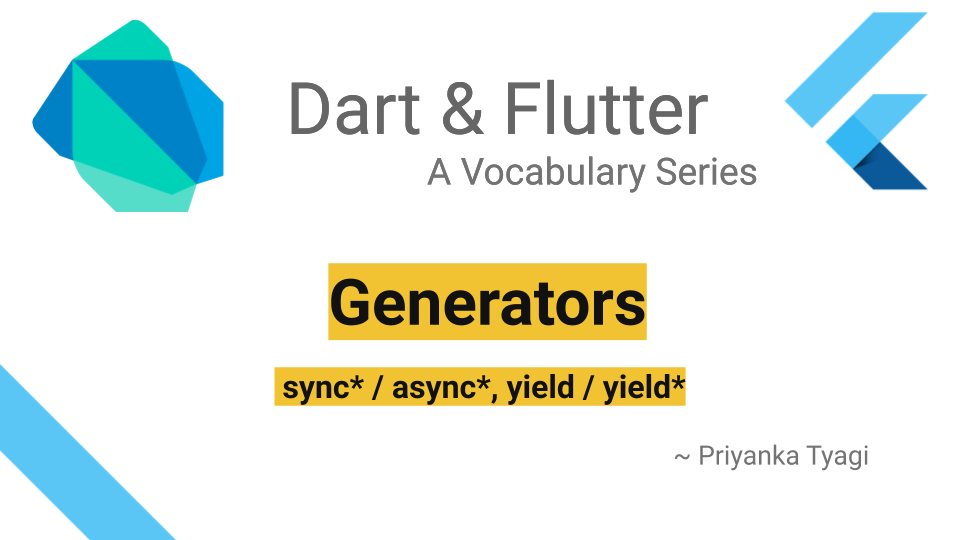Dart Generators
Posted on June 07, 2020 in Dart

Introduction
Dart generator functions are used to generate sequence of values on-demand lazily. Such value sequence can be generated either synchronously or asynchronously. There are two types of built-in generator functions available to support both scenarios:
- Synchronous Generator: Synchronous generator function returns an Iterable object. That means first the values are generated and then returned lazily on-demand by the function.
Iterable: A collection of values, or "elements", that can be accessed sequentially.
- Asynchronous Generator: Asynchronous generator function returns a Stream object. The sequence of values is generated on demand as they become available.
Stream: A source of asynchronous data events.
Check out YouTube Video
Let's understand generator functions with help of an example. We'll generate numbers starting from a given number say 5 until 0, using generator functions. We'll observe both ways (asynchronous and synchronous generators) to create this number sequence.
Using sync* - Synchronous Generator
The function Iterable<int> countDownFromSync(int num) sync* takes a number as num, and sends out all numbers starting from num until 0. The synchronous generator function is marked with sync*. The values are returned using yield keyword. The iterable sequence receives the number sequence and print each number using for loop. This number sequence actually is not generated until it has been accessed by for loop.
main1():
void main1() {
print("Getting CountDown Iterable [sync* + yield]");
Iterable<int> sequence = countDownFromSync(5);
print("Starting...");
for (int value in sequence) {
print(value);
}
print("DONE");
}
//sync*
Iterable<int> countDownFromSync(int num) sync* {
while (num > 0) {
yield num--;
}
}
Output:
The sync* helps to generate values in a synchronous manner. Note that Starting... message is printed before for loop's execution. The DONE message is executed at last as well.
Getting CountDown Iterable [sync* + yield]
Starting...
5
4
3
2
1
DONE
Using async* - Asynchronous Generator
The function Stream<int> countDownFromAsync(int num) async* takes a number as num, and deliver number sequence starting from num until 0. The asynchronous generator function is marked with async*. The values are returned using yield keyword. The stream sequence receives the number sequence. Its values can be accessed as soon as it got started listening upon.
main2():
void main2() {
print("Getting CountDown Stream [async* + yield]");
Stream<int> sequence = countDownFromAsync(5);
print("Starting...");
sequence.listen((int value) {
print(value);
});
print("DONE");
}
//async*
Stream<int> countDownFromAsync(int num) async* {
while (num > 0) {
yield num--;
}
}
Output:
The async* helps to generate values in an asynchronous manner. Note that Starting... and DONE messages/setup are printed before actual stream's values are printed. The values are printed as they become available after the setup code.
Getting CountDown Stream [async* + yield]
Starting...
DONE
5
4
3
2
1
Using sync* + yield* - Recursive Synchronous Generator
When generator functions are used recursively, yield* is used to mark such recursive function calls. This example shows how to use generator functions recursively. You'll notice the same output as for the non-recursive implementation. The keyword yield* is used for the function that's called recursively.
void main3() {
print("Getting CountDown Iterable [sync* + yield*]");
Iterable<int> sequence = countDownFromSyncRecursive(5);
print("Starting...");
for (int value in sequence) {
print(value);
}
print("DONE");
}
//sync* + yield* for recursive functions
Iterable<int> countDownFromSyncRecursive(int num) sync* {
if (num > 0) {
yield num;
yield* countDownFromSyncRecursive(num - 1);
}
}
Output:
Getting CountDown Iterable [sync* + yield*]
Starting...
5
4
3
2
1
DONE
Using async* + yield* - Recursive Asynchronous Generator
This is an example of using an asynchronous generator function recursively. It also has the same output as its non-recursive counter-part.
void main4() {
print("Getting CountDown Stream [async* + yield*]");
Stream<int> sequence = countDownFromAsyncRecursive(5);
print("Starting...");
sequence.listen((int value) {
print(value);
});
print("DONE");
}
//async* + yield* for recursive functions
Stream<int> countDownFromAsyncRecursive(int num) async* {
if (num > 0) {
yield num;
yield* countDownFromAsyncRecursive(num - 1);
}
}
Output:
Getting CountDown Stream [async* + yield*]
Starting...
DONE
5
4
3
2
1
Summary
In this article, we saw how to use Dart's generator function to produce an on-demand sequence of values synchronously and asynchronously in an iterative and recursive manner.
That's it for this article. Check out the Dart Vocabulary Series for other Dart stuff.
Source Code
Please checkout the source code at Github here
References
Happy Darting :)
_Liked the article? Couldn't find a topic of interest? Please leave a comment or reach out at twitter about the topics you would like me to share!
BTW I love cupcakes and coffee both :)_
Follow me at Medium